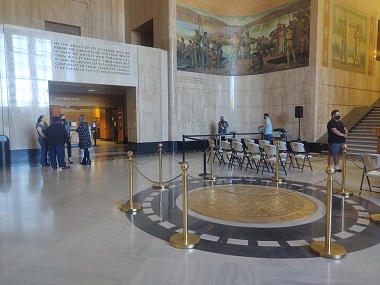An in-depth look at the State budget
 Editor’s note: This is the first in a multi-part series on the budget for the State of Oregon and where possible efficiencies can be found.
Editor’s note: This is the first in a multi-part series on the budget for the State of Oregon and where possible efficiencies can be found.
This article is the first in a series of articles on the budget of the State of Oregon, with a specific focus on how it can be cut is such a way that minimizes the impact on taxpayers. Oregon does budgets on a two-year cycle, called a biennium, which means that spending and revenue are projected for two years. If you'd like to, you can
read the entire 546 page budget for the 2019-21 biennium. If you are busy and don't really have the time, you can read the
2019-21 Budget Highlights which is only 207 pages long. Spoiler alert: The final tally is $85.8 Billion.
The primary source for information on the budget is the
Oregon Legislative Fiscal Office, which works for the legislature to craft the budget. Working out of the limelight, they do the work of listening to the various elected officials and weaving their priorities into the budget (actually many budgets) that the legislature votes on.
This series is focused on budget cuts, and some cuts make more sense than others -- not because of where the money is spent -- but because of where the money comes from. For instance, about $22.4 Billion is the General Fund, which, for the most part, comes from income taxes paid by individuals and corportations. Cuts from these funds would make possible tax cuts or other spending possibilities, as decided by the legislature. This is where the real action is. As a side note, even though much of lottery funds are dedicated, lottery funds most always displace spending that would be general fund spending if the lottery funds were not available. Because of that, lottery funds are viewed as similar to general funds.
A slightly larger chunk of the budget is money from the Federal Government. It may be easy to say, “Let’s cut welfare,†but at the end of the day, most welfare -- though administered by the state -- is paid for by the Federal Government. It's surely true that these are still taxpayer dollars and that the money ultimately comes proportionally from Oregonians, or -- because the feds are so deep in debt -- from Oregonian’s grandkids, but cuts to federally funded programs merely create space for the feds to fund another program in another state.
The last kind of revenue is called "Other funds" and it’s not just an "everything that doesn’t fit" category. It has an actual meaning. It’s all the money that the state receives in the form of fees, fines and sales. In a perfect world, the state would have all people who use state services pay for those services, and the state does this as far as it is able and fair. So, if you want to camp in a state park, the state charges you a fee for that to cover the costs of maintenance. Lately, state parks have been booking up earlier and earlier, and if the state of Oregon was a for-profit entity, they would keep increasing the price, as the demand went up. As a state steward of all the resources for all Oregonians, the state has determined that these resources should be available to all Oregonians, not just the rich. That makes some sense, though now they are only available to those who click the fastest.
In other ways, the state tries to get payment from those who use the services. If you drive a car, you use the roads in the state and you’ll probably eventually buy gas, which is taxed and constitutionally dedicated to roads. If you walk, you don't pay that tax. The same is true if you buy a fishing license, rent public housing, or many other ways to use state services that are not availble to all.
Unfortunately, it’s not always possible to charge people for the services they are provided. Some of the Oregon Health Plan, for instance, is funded by the state general fund. We can’t charge poor people a health care premium that they are unable to afford. And good luck trying to get inmates in the Oregon State Correctional Institutions to pay for their room and board, though they are involved in some economic activities that bring money into the state. You guessed it. This money is called "other funds."
In the coming days, this series will explore in detail possible cuts to Oregon's budget. This is a questions that will arise during upcoming sessions and long into the future. This is a conversation that is sometimes obscure, sometimes controversial, and sometimes in the tall weeds, but is always necessary.
--Staff Reports| Post Date: 2020-07-06 08:00:00 | Last Update: 2020-07-06 08:28:05 |







 Editor’s note: This is the first in a multi-part series on the budget for the State of Oregon and where possible efficiencies can be found.
Editor’s note: This is the first in a multi-part series on the budget for the State of Oregon and where possible efficiencies can be found.